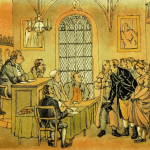Monday: Read 2 Thess 3:1-18
Paul asks the Thessalonians, “Pray for us” (1). Paul’s request is not a generic thing. Nor is he simply speaking Christianese. He follows this request with two purpose clauses.
First, they are to pray for him in order that “the word of the Lord will spread rapidly.” Paul knew well that “church growth,” or the effectiveness of the proclamation, was a result of the work of the Spirit. Therefore, prayer was needed.
Second, they are to pray for him in order that “we will be rescued from perverse and evil men” (2). Paul was also aware of the fact that the Gospel is not always well received. The proclamation that Jesus is Lord doesn’t sit well in a world full of other Lords (e.g., Caesar, religion, wealth, pride, self-centeredness, greed, anger).
Paul brings the letter to a conclusion by exhorting the Thessalonians to “keep away” from those in the church who lead an “unruly life” (6, 14). That Paul follows this command with an encouragement to “follow our example” (7, 9), and that his example includes working diligently to earn his own living (8) indicates that he has the same group in mind which he instructed regarding work in 1 Thess 4:11. We noted earlier that this group was concerned with attaching themselves to a patron in order to secure their financial well-being.
Paul does indicate that there are some who are “doing no work at all, but acting like busybodies” (11). Even here Paul’s concern is not so much that they are refusing to work, but that with what they are doing in their idleness; namely, getting into others’ affairs and refusing to mind their own business.
Paul closes the letter with his signature: “I, Paul, write this greeting with my own hand” (17). He notes, “this is a distinguishing mark in every letter; this is the way I write” (17). This is likely a response to the fact that the Thessalonians had received a false report/letter (2:2).
Questions to ponder/discuss:
- Social separation of members in sin was intended to correct those who refuse to conform. Since a person’s identity was bound to the group to which he/she belonged, the goal of separating from them was intended to cause them to reconsider. It should be noted that the primary means of disassociation was to exclude them from the communion meal. We should also note that this practice has been abused by many throughout Church history. In addition, since it is no longer the case that one’s identity is bound to a local church, such a practice today will not bring about its intended desire of repentance suggests that we ought to be very careful before we consider applying it in our churches today.
- We must be careful about too quickly judging (and even condemning) others who are not “working.” Though indeed we should not encourage or support those who are capable of working and simply refuse to do so, most people who are not working would love an opportunity to work.
- What are some things we can do so that we might assist those who are homeless?
Tuesday: Read 1 Timothy 1:1-20
First Timothy begins a series of letters written by Paul to individuals. Paul begins by reminding Timothy that he left him in Ephesus so that Timothy might “instruct certain men not to teach strange doctrines” (3). Paul reminds Timothy that the goal of such instruction “is love from a pure heart and a good conscience and a sincere faith” (5).
What exactly these false teachers were proclaiming is not completely clear (remember that because Timothy knew full well what they were teaching there was no need for Paul to spell it out in the letter). Whatever the false teachers were saying it included a misuse of the Law. Paul replies that “the Law is good, if one uses it lawfully” (8). After all, the Law was written to establish a society of justice.
Paul reminds Timothy, “Christ Jesus came into the world to save sinners, among whom I am foremost of all. Yet for this reason I found mercy, so that in me as the foremost, Jesus Christ might demonstrate His perfect patience as an example for those who would believe in Him for eternal life” (15-16).
Questions to ponder/discuss:
- Commanding false teachers to stop is to act lovingly both for the teachers—so that they may not come under a greater judgment—and to those who receive this teaching (4:16). How often do we consider proper instruction as an act of love?
- Paul’s reminder of who he was before Christ and that he was still shown mercy should be a reminder that God is in the business of transforming lives. Make an effort to pray for those who have done you harm. After all, they are persons from whom Christ died. How might looking at people like this change the way we act toward them? Does it help to be reminded that we too were sinful, broken people?
Wednesday: Read 1 Timothy 2:1-8
Paul next provides Timothy with instructions on worship. He begins with “first of all” (1). Labeling it as “first” is not necessarily intended to indicate a list of things to follow as much as it indicates the significance of the present item! That this is followed with “I urge” (which could be translated as “exhort”) affirms the importance of the command.
Paul encourages Timothy to pray for everyone, especially those in power (1-2). He uses four terms to express his call to prayer. The use of four different terms suggests that each has a slight nuance of meaning.
First, Timothy is to offer “entreaties” (NAS; “supplications”: ESV; NKJ; NRS; “requests”: NET; NIV). This term indicates an appeal to God for a particular need.
Second, he uses “prayers” which is a general word for prayer.
Third, Paul says to offer “petitions” (NAS; “intercessions”: ESV; NET; NIV; NKJ; NRS). Petitions express a concern for others and their situation.
Finally, Paul says to offer “thanks/thanksgivings.” This term expresses thankfulness to God for all.
Paul adds that offering such prayers for all persons is good because God desires all people to be saved (4).
Questions to ponder/discuss:
- The notion that we should pray for our leaders follows from his words in chapter 1. Namely, that God is in the business of rescuing sinners and that He gave the Law to serve as a means of justice. Paul’s words in 2:3 affirm that one of the motivations behind the encouragement to pray for them is “so that we may lead a tranquil and quiet life in all godliness and dignity” (3). Make an effort this week to pray for those in authority—whether you voted for them or not! Pray that they may bring justice for the oppressed.
Thursday: Read 1 Timothy 2:9-15
This passage has certainly led to much controversy throughout the years. There is little doubt that it is one of the central texts for those who advocate that only men can be pastors.
Paul notes that women are “to adorn themselves with proper clothing, modestly and discreetly” (9). In saying this, he seems to be referring to the wearing of things that attract more attention to one’s dress than to one’s character and deeds. We know that elaborate hairstyles, ornate jewelry, and extremely expensive clothing were commonplace among the elite. One commentator notes, “Paul is forbidding a style of dress and hair that was known to his readers and that was particularly reprehensible because of its immodesty and its cost in time, money, and effort” (Knight, 138).
Paul appears to forbid women from serving in pastoral ministry—though some limit it to a role over men, while others limit it to being the lead pastor. After all, he says that they cannot “teach or exercise authority over a man” (12). The argument is that teaching and having authority are two of the primary responsibilities of a pastor.
This passage is greatly disputed (12). Some suggest that Paul’s prohibition against women continues into the present. Others suggest that they were relative to the situation in the early church.
Paul bases his prohibition on the creation narrative of Genesis 1-3. He appeals both to the fact that Adam was made first and that Eve was deceived first (13-14). For some, these two points confirm that Paul has provided an abiding provision. After all, it will always be true that Adam was made first and that Eve was the one who was deceived.
Others, however, note that being “first” isn’t an absolute throughout Scripture. The fact that many of the leaders of Israel (e.g., Isaac, Jacob, Judah, David) were not the firstborn suggests that this is not an abiding principle. In addition, it is argued that we must consider why it was that Eve or anyone else for that matter was subject to deception. William Webb has argued that the only outstanding reason why a woman would be more subject to deception is because she is not educated. In other words, Webb notes that there is nothing inherent about being a woman that makes her more prone to deception. Thus, some conclude, Paul’s prohibition here is culturally dependent.
With regard to Paul’s assertion that “women will be preserved through the bearing of children” (15), we should note that Paul is simply referring to Eve and the curse of Gen 3:16. It has nothing to do with her eternal “salvation.”
Questions to ponder/discuss:
- Paul’s words on how one is to dress have led to misuse. There is something to be said about “wearing your best for God.” But I have had people not come to my church because they didn’t have any nice clothes and they didn’t want to be shamed (sure this may have only been an excuse. But the point is that we need to be considerate of others and not legislating clothing that discourages some from attending).
- Regardless of your view of men and women in ministry, we should all recognize that women have gifts given to them by God and that we should aim to provide environments in which they are allowed to flourish in the exercising of those gifts. How might you help to create a community in which women flourish?
Friday: Read 1 Timothy 3:1-7
Paul continues his discussion on worship by addressing the requirements for being a pastor. One of the first things that we must recognize in this list is that it applies to all Christians. Paul is not saying, “only pastors should be . . . .” What Paul is saying here is that those who want to be in pastoral ministry should be exemplars when it comes to Christian character and conduct. Also, we could err by taking this list and making them absolutes. After all, no one is absolutely “above reproach.”
Paul’s list includes (3-7):
- “above reproach”: the idea is that it is impossible to bring a charge against such a person. Some see this as the primary requirement and all the rest are subordinate to it.
- “husband of but one wife”: there are various interpretations here. Perhaps the general indication is that they should be faithful in the marital and sexual realm. This appears to be the natural meaning of the phrase. If so, it is similar to “do not commit adultery.”
- ‘temperate: in classical Greek, this word meant “not mixed with wine.” Paul may mean nothing more than “sober” or “having a clear mind.”
- “self-controlled” or ‘prudent”—the prudent thoughtful aspect of self-control (BADG); Tit 1:8 NASB “sensible”: moderation in all things; one who exercises good judgment in all circumstances; control over all bodily functions (physically; spiritually; emotionally; etc.)
- “Respectable”: implies modesty and honorable.
- Hospitable”
- “Able to teach”
List of negatives that they must not be:
- “Not given to drunkenness”
- “Not violent but gentle”
- “Not quarrelsome”
- “Not a lover of money”
- “Manage his own family well and see that his children obey him with proper respect” (4)
- “Not be a recent convert”: Paul adds that a new convert is “may become conceited and fall under the same condemnation incurred by the devil”
- “Must have a good reputation with outsiders” (7)
Questions to ponder/discuss:
- Perhaps we should begin by exhorting you to pray regularly for those in ministry. The pressure upon ministers is tremendous. Many congregants expect pastors to be present for them whenever they have a need. Others expect ministers to be perfect (taking the “above reproach” as an absolute). Those who preach are expected to have dynamic messages every week. They must also lead their staff well. And they must navigate their congregations in the midst of a divided society (during the pandemic it was questions such as masks or no masks?; meet or don’t meet?). Of course, they are also expected to attend to their marriages and families.
[1] This guide is meant to be done either as a group study over the course of 2 or 4 meetings (Day 1-5; 6-10; 11-15; 16-20), or as a private devotion over the course of 4 weeks (or a calendar month—5 lessons per week).















